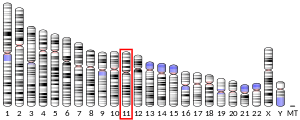EHD1
EH domain-containing protein 1, also known as testilin or PAST homolog 1 (PAST1), is a protein that in humans is encoded by the EHD1 gene[4] belonging to the EHD protein family.
Function
This gene belongs to a highly conserved gene family encoding EPS15 homology (EH) domain-containing proteins. The protein-binding EH domain was first noted in EPS15, a substrate for the epidermal growth factor receptor. The EH domain has been shown to be an important motif in proteins involved in protein-protein interactions and in intracellular sorting. The protein encoded by this gene is thought to play a role in the endocytosis of IGF1 receptors.[4]
Interactions
EHD1 has been shown to interact with Insulin-like growth factor 1 receptor[5] and SNAP29.[5]
gollark: Palaiopsychological profile.
gollark: gibson reveal aardvarks.
gollark: Does discord.js not have something for that?
gollark: Can you make it somehow just show the name instead of the IÐ, but not pinginate?
gollark: +>markov 258639553357676545 2
References
- GRCh38: Ensembl release 89: ENSG00000110047 - Ensembl, May 2017
- "Human PubMed Reference:". National Center for Biotechnology Information, U.S. National Library of Medicine.
- "Mouse PubMed Reference:". National Center for Biotechnology Information, U.S. National Library of Medicine.
- "Entrez Gene: EHD1 EH-domain containing 1".
- Rotem-Yehudar, R; Galperin E; Horowitz M (Aug 2001). "Association of insulin-like growth factor 1 receptor with EHD1 and SNAP29". J. Biol. Chem. United States. 276 (35): 33054–60. doi:10.1074/jbc.M009913200. ISSN 0021-9258. PMID 11423532.
Further reading
- Di Fiore PP, Pelicci PG, Sorkin A (1998). "EH: a novel protein-protein interaction domain potentially involved in intracellular sorting". Trends Biochem. Sci. 22 (11): 411–3. doi:10.1016/S0968-0004(97)01127-4. PMID 9397678.
- Andersson B, Wentland MA, Ricafrente JY, et al. (1996). "A "double adaptor" method for improved shotgun library construction". Anal. Biochem. 236 (1): 107–13. doi:10.1006/abio.1996.0138. PMID 8619474.
- Yu W, Andersson B, Worley KC, et al. (1997). "Large-Scale Concatenation cDNA Sequencing". Genome Res. 7 (4): 353–8. doi:10.1101/gr.7.4.353. PMC 139146. PMID 9110174.
- Guru SC, Agarwal SK, Manickam P, et al. (1997). "A Transcript Map for the 2.8-Mb Region Containing the Multiple Endocrine Neoplasia Type 1 Locus". Genome Res. 7 (7): 725–35. doi:10.1101/gr.7.7.725. PMC 310681. PMID 9253601.
- Mintz L, Galperin E, Pasmanik-Chor M, et al. (1999). "EHD1--an EH-domain-containing protein with a specific expression pattern". Genomics. 59 (1): 66–76. doi:10.1006/geno.1999.5800. PMID 10395801.
- Haider NB, Searby C, Galperin E, et al. (2000). "Evaluation and molecular characterization of EHD1, a candidate gene for Bardet-Biedl syndrome 1 (BBS1)". Gene. 240 (1): 227–32. doi:10.1016/S0378-1119(99)00395-9. PMID 10564830.
- Pohl U, Smith JS, Tachibana I, et al. (2000). "EHD2, EHD3, and EHD4 encode novel members of a highly conserved family of EH domain-containing proteins". Genomics. 63 (2): 255–62. doi:10.1006/geno.1999.6087. PMID 10673336.
- Rotem-Yehudar R, Galperin E, Horowitz M (2001). "Association of insulin-like growth factor 1 receptor with EHD1 and SNAP29". J. Biol. Chem. 276 (35): 33054–60. doi:10.1074/jbc.M009913200. PMID 11423532.
- Caplan S, Naslavsky N, Hartnell LM, et al. (2002). "A tubular EHD1-containing compartment involved in the recycling of major histocompatibility complex class I molecules to the plasma membrane". EMBO J. 21 (11): 2557–67. doi:10.1093/emboj/21.11.2557. PMC 126039. PMID 12032069.
- Galperin E, Benjamin S, Rapaport D, et al. (2003). "EHD3: a protein that resides in recycling tubular and vesicular membrane structures and interacts with EHD1". Traffic. 3 (8): 575–89. doi:10.1034/j.1600-0854.2002.30807.x. PMID 12121420.
- Strausberg RL, Feingold EA, Grouse LH, et al. (2003). "Generation and initial analysis of more than 15,000 full-length human and mouse cDNA sequences". Proc. Natl. Acad. Sci. U.S.A. 99 (26): 16899–903. Bibcode:2002PNAS...9916899M. doi:10.1073/pnas.242603899. PMC 139241. PMID 12477932.
- Gevaert K, Goethals M, Martens L, et al. (2004). "Exploring proteomes and analyzing protein processing by mass spectrometric identification of sorted N-terminal peptides". Nat. Biotechnol. 21 (5): 566–9. doi:10.1038/nbt810. PMID 12665801.
- Ota T, Suzuki Y, Nishikawa T, et al. (2004). "Complete sequencing and characterization of 21,243 full-length human cDNAs". Nat. Genet. 36 (1): 40–5. doi:10.1038/ng1285. PMID 14702039.
- Naslavsky N, Boehm M, Backlund PS, Caplan S (2005). "Rabenosyn-5 and EHD1 Interact and Sequentially Regulate Protein Recycling to the Plasma Membrane". Mol. Biol. Cell. 15 (5): 2410–22. doi:10.1091/mbc.E03-10-0733. PMC 404033. PMID 15020713.
- Guilherme A, Soriano NA, Furcinitti PS, Czech MP (2004). "Role of EHD1 and EHBP1 in perinuclear sorting and insulin-regulated GLUT4 recycling in 3T3-L1 adipocytes". J. Biol. Chem. 279 (38): 40062–75. doi:10.1074/jbc.M401918200. PMID 15247266.
- Xu Y, Shi H, Wei S, et al. (2005). "Mutually exclusive interactions of EHD1 with GS32 and syndapin II". Mol. Membr. Biol. 21 (4): 269–77. doi:10.1080/09687680410001716871. PMID 15371016.
- Gerhard DS, Wagner L, Feingold EA, et al. (2004). "The Status, Quality, and Expansion of the NIH Full-Length cDNA Project: The Mammalian Gene Collection (MGC)". Genome Res. 14 (10B): 2121–7. doi:10.1101/gr.2596504. PMC 528928. PMID 15489334.
- Lee DW, Zhao X, Scarselletta S, et al. (2005). "ATP binding regulates oligomerization and endosome association of RME-1 family proteins". J. Biol. Chem. 280 (17): 17213–20. doi:10.1074/jbc.M412751200. PMID 15710626.
- Olsen JV, Blagoev B, Gnad F, et al. (2006). "Global, in vivo, and site-specific phosphorylation dynamics in signaling networks". Cell. 127 (3): 635–48. doi:10.1016/j.cell.2006.09.026. PMID 17081983.
This article is issued from Wikipedia. The text is licensed under Creative Commons - Attribution - Sharealike. Additional terms may apply for the media files.





